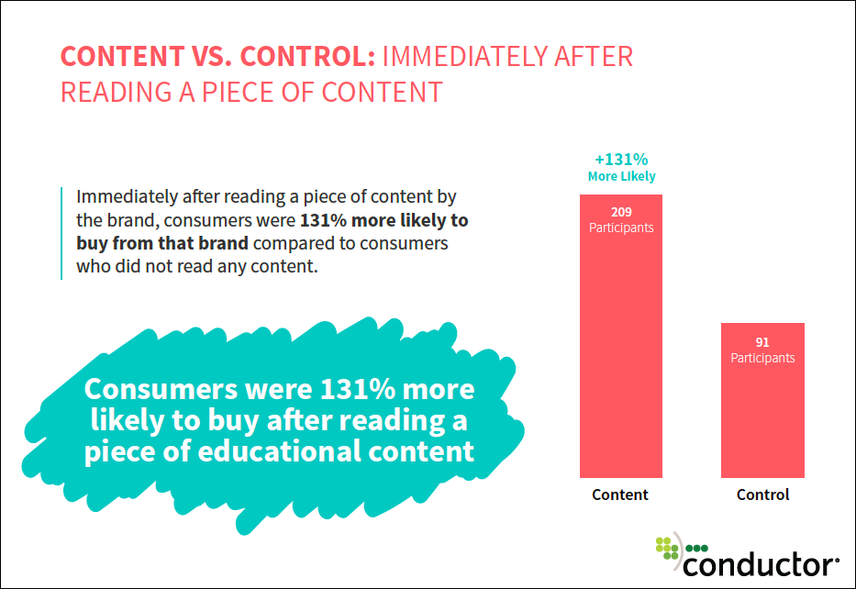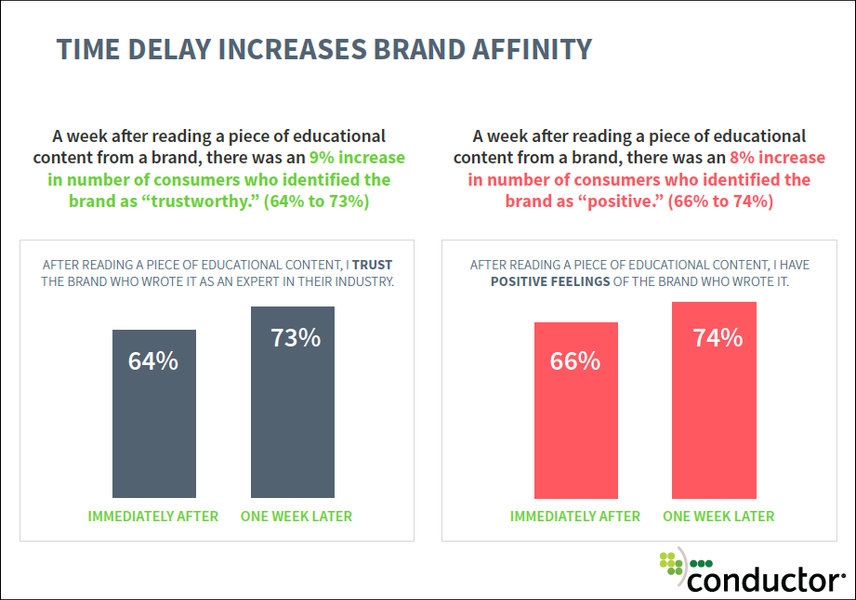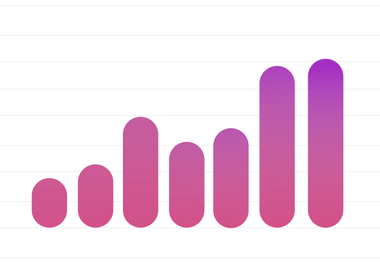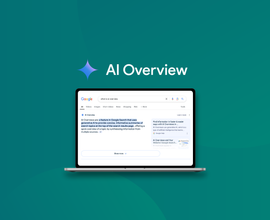Educational Content Makes Consumers 131% More Likely to Buy
The secret to winning customers? Content. Consumers who read educational content from a brand before purchase were more likely to convert – even one week later.
You know that your customer’s content journey has a beginning, middle, and end. But do you know just how powerful that beginning is?
Our new content marketingContent Marketing
Content marketing is a marketing discipline with the goal of increasing awareness and scope for products and brands in the desired target group with content published on the web and offline.
Learn more research shows that providing early-stage, educational content has a profound impact on purchase decisions and brand trust.
Here’s what we discovered:
Early Stage Content Has a Major Impact on Likelihood to Purchase
According to the new research, consumers are 131% more likely to buy from a brand immediately after they consume early-stage, educational content. (Share to Twitter)
We determined this by testing 3 different articles using mock brands with both a control and a test group. We surveyed them immediately after they read the content, and then again a week later to understand the impact of time.
The educational articles they read:
- How to Make Almond Milk (written by KitchenTech Blenders)
- Throwing a Party This Summer? Here are 25 Backyard Party Ideas (written by PowerSoundz)
- Backpacking 101: What You Need To Know to Get Started (written by Ozawa Peak Outfitters)
The results:

A week later, the impact was still strong – consumers were still 48% more likely to buy from the brand that educated them.
When given a lineup of 4 brands to purchase from, 83.6% of consumers chose the brand that provided them with educational content.
The Impact of Educational Content on Trust and Brand Affinity
And beyond purchase power, educational content has a powerful effect on consumer trust and brand affinity.
Here’s a fascinating stat: a week after reading the content, consumers actually found that brand more trustworthy and had a greater affinity than when they immediately read the content. (Share to Twitter)

This means that when a consumer interacts with content, their brand affinity actually compounds with time, rather than diminishes.
Content creates a feeling of reciprocity immediately, and as time passes, that positive memory becomes idealized – a phenomenon that psychologists call rosy retrospection — and the trust and relationship grow even when they are not in direct contact with your brand.
6 Great POVs on the Power of Educational Content
When we put research out into the world, we know it’s just as important to get the why as it is the what. We showed this research to 6 marketing experts that we admire to get their take on these findings:
Rand Fishkin
For a long time, content marketers have pointed to correlations between content consumption and conversionConversion
Conversions are processes in online marketing that lead to a defined conclusion.
Learn more, but it’s always been challenging to prove causality, and even more challenging to make the case for content investments without initial data to prove its value.
Conductor’s research into how content biases brand selection and conversion choices is perfect for filling in these gaps, and is sure to help many marketers more effectively make the case for content.
If it wasn’t obvious before, it is now: content that engages your audience also helps open their wallets.
David Beebe
In today’s multiscreen world, where we all of us are consuming, creating, and curating content constantly, it’s harder than ever for brands to break through the clutter. Brands need to understand that the days of interruptive marketing are over.
Consumers control when, where, and how they interact with brands. In order to break through, brands need to stop interrupting what consumers are interested in and become what they are interested in.
Interruptions upset consumers, and the only real way to gain the trust of the consumer is for the brand to create creative and content that adds value first, meaning it either informs, educates, entertains, or solves a problem for them.
Content marketing does just that, and if it does those things and is relevant, the consumer will appreciate that and over time and will remember the positive interaction, which builds trust, and ultimately builds brand loyalty.
Robert Rose
The fact that high quality, educational, content creates more trust, a more likely buyer and more loyalty feels like something we should just know inherently. But this research is fantastic in that it illustrates just exactly how much impact educational content can have.
Trust, like attention, is a precious commodity these days. And, anything that helps us deliver a more trusted experience to our customers should be prioritized to the top of the list.
This research from Conductor shows us just how much of a priority educational content should be for businesses.
John Doherty
In today’s day and age on the internet, there is no shortage of choices so we have to move from pure acquisition to thinking long term about retention and repeat customers if we hope to compete in a crowded market.
This is also the reason why many businesses are focusing so hard on net promoter score, as cementing a positive perception of your business in the minds of your customers is the right long term play for a business. And content can help here.
These two statistics put numbers to what marketers have been saying forever – content builds brands.
Margaret Magnarelli
This is great data to underscore the importance of serving your customers’ needs. I’m a total believer in educational content, and the role it can play in helping your brand build meaningful and profitable relationships.
You build loyalty by helping someone with something, so then when they are ready to buy they remember that. Show and tell is the new sell, sell, sell.
You build loyalty by helping someone with something, so then when they are ready to buy they remember that. Show and tell is the new sell, sell, sell.
It may be more indirect, but it can be way more efficient.
Nick Edouard
This new research highlights an important evolution that’s taking place in the marketing world: content consumption is the best indicator of sales-readiness. As B2B buyers take more control over their own purchasing process, content allows them to have a relationship with your brand before they ever talk to a human.
Tracking and measuring that content consumption is the key to having meaningful conversations once they finally decide to pick up the phone to talk to a sales rep.
We hope that this study helps you – let us know what you think.

![Rand Fishkin, Cofounder & CEO, [object Object]](https://cdn.sanity.io/images/tkl0o0xu/production/625c9e9ee4fdee056d774ab2bae0f7b29dbf0fd8-800x800.jpg?fit=min&w=100&h=100&dpr=1&q=95)

![Robert Rose, Chief Content Adviser, [object Object]](https://cdn.sanity.io/images/tkl0o0xu/production/9e71a76aba70e77d7e11f2b04976d4d25e2ae1bb-400x400.jpg?fit=min&w=100&h=100&dpr=1&q=95)
![John Doherty, Founder, [object Object]](https://cdn.sanity.io/images/tkl0o0xu/production/e821f475801bc0d62d0a242bcad48d577828c54b-666x666.jpg?fit=min&w=100&h=100&dpr=1&q=95)
![Margaret Magnarelli, VP, Marketing & Communications, [object Object]](https://cdn.sanity.io/images/tkl0o0xu/production/9660ed59a393e85b3fa2c2bbde5da5b11750a377-800x800.jpg?fit=min&w=100&h=100&dpr=1&q=95)
![Nick Edouard, COO, [object Object]](https://cdn.sanity.io/images/tkl0o0xu/production/8d754b5223a8ca422294330b4a9c451d6a9094fa-416x416.jpg?fit=min&w=100&h=100&dpr=1&q=95)






